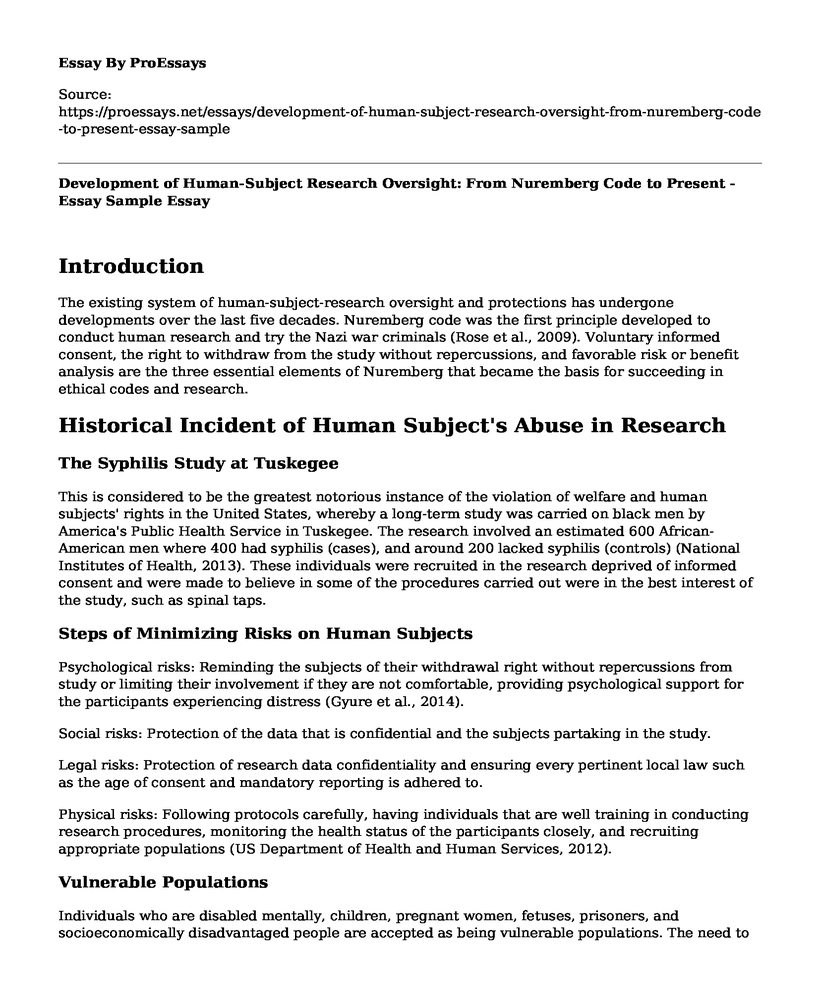Introduction
The existing system of human-subject-research oversight and protections has undergone developments over the last five decades. Nuremberg code was the first principle developed to conduct human research and try the Nazi war criminals (Rose et al., 2009). Voluntary informed consent, the right to withdraw from the study without repercussions, and favorable risk or benefit analysis are the three essential elements of Nuremberg that became the basis for succeeding in ethical codes and research.
Historical Incident of Human Subject's Abuse in Research
The Syphilis Study at Tuskegee
This is considered to be the greatest notorious instance of the violation of welfare and human subjects' rights in the United States, whereby a long-term study was carried on black men by America's Public Health Service in Tuskegee. The research involved an estimated 600 African-American men where 400 had syphilis (cases), and around 200 lacked syphilis (controls) (National Institutes of Health, 2013). These individuals were recruited in the research deprived of informed consent and were made to believe in some of the procedures carried out were in the best interest of the study, such as spinal taps.
Steps of Minimizing Risks on Human Subjects
Psychological risks: Reminding the subjects of their withdrawal right without repercussions from study or limiting their involvement if they are not comfortable, providing psychological support for the participants experiencing distress (Gyure et al., 2014).
Social risks: Protection of the data that is confidential and the subjects partaking in the study.
Legal risks: Protection of research data confidentiality and ensuring every pertinent local law such as the age of consent and mandatory reporting is adhered to.
Physical risks: Following protocols carefully, having individuals that are well training in conducting research procedures, monitoring the health status of the participants closely, and recruiting appropriate populations (US Department of Health and Human Services, 2012).
Vulnerable Populations
Individuals who are disabled mentally, children, pregnant women, fetuses, prisoners, and socioeconomically disadvantaged people are accepted as being vulnerable populations. The need to identify this group was due to the historical examples whereby these subjects were much exploited for medical experimentation purposes (Park & Grayson, 2008). The implementation of the provision of protection to the vulnerable populations was started in order to ensure that clinical research adheres to the ethical standards. The Tuskegee experiment and the Nuremberg trials, which are some of the historical examples where vulnerable subjects in medical research were treated inappropriately, led to the Nuremberg Code that outlined the fulfillment of the criteria before experimentation could proceed (Park & Grayson, 2008).
Appropriate Ways to Recruit Subjects
Belmont Principles that were drafted in 1979 are the basis pf subject recruitment ethics. The principles entail respect for persons, justice, and beneficence, thus forming the federal guidelines underpinnings for human research protections (Gyure et al., 2014). The justice principle addresses practices regarding fairly and equitable recruitment across various demographic features of possible appropriate persons. The respect for a person's principle involves the need for suitably contacting, approaching, and informing the potential research subjects and observing their right for confidentiality and privacy. The beneficence principle considers benefit and risk or burden within recruitment experience (Gyure et al., 2014).
Obtaining Consent Properly
Attaining consent encompasses informing the subjects regarding their rights, the main objective of the research, the procedures to be undertaken, and the possible benefits and risks of participating in the research (Rose et al., 2009). The subjects to take part in the research should be willing to participate. The vulnerable people, such as pregnant women, prisoners, and children, should be provided with extra protection.
Elements of Properly Executed Consent
The guidelines for the protection of human subjects 45 CFR 46 require that when human subjects take part in research, they are supposed to be given adequate information to prove truly voluntary and informed consent (Rose et al., 2009). The participants must be provided with the purpose of the study, procedures involved, participation alternatives, risks, and benefits of the research, length time expected for the subjects in the study, and confidentiality statement.
Committees are responsible for monitoring the protection of human subjects.
Institutional Review Board (IRB) is an established committee in accord with and for the purposes outlined in the 45 CFR and 21 CFR 56. The primary responsibility of the IRBs is protecting the rights and safeguarding the welfare of human research participants. It also reviews, monitor, approve, or disapprove research that involves human participants.
ReferencesGyure, M. E., Quillin, J. M., Rodríguez, V. M., Markowitz, M. S., Corona, R. A., Borzelleca, J. F & Bodurtha, J. N. (2014). Practical considerations for implementing research recruitment etiquette. IRB, 36(6), 7.
National Institutes of Health. (2013). Protecting Human research participants. NIH Office of extramural research.
Park, S. S. & Grayson, M. H. (2008). Clinical research: Protection of the "vulnerable"?. Journal of Allergy and Clinical Immunology, 121(5), 1103-1107.
Rose, S., Aburto, M., Hagemann, J., & Shahnazarian, D. (2009). Informed consent in human subjects research. The University of South California.[Online]: Available at: https://oprs. USC. Edu/files/2017/04/Informed-Consent-Booklet-4.4, 13.
US Department of Health and Human Services. (2012). Protection of human subjects. 45 CFR § 46. Subparts AD.
Cite this page
Development of Human-Subject Research Oversight: From Nuremberg Code to Present - Essay Sample. (2023, Aug 22). Retrieved from https://proessays.net/essays/development-of-human-subject-research-oversight-from-nuremberg-code-to-present-essay-sample
If you are the original author of this essay and no longer wish to have it published on the ProEssays website, please click below to request its removal:
- Case Study: Pfizer Diversity and Inclusion
- The Arab Image in the Mind of the Western Image-Makers
- Critical Reflection on the Plight of Immigrants in Relation to My Experience as an E.U. Citizen Living in the U.K.
- High Rent Prices in SF Bay Area: The Cause of Unaffordable Housing - Research Paper
- Essay Example on the Mysterious Origins of Shinto: Worshipping Local Divinities
- Women Empowerment: Achieving Gender Equality in the Publishing Industry - Essay Sample
- Request for Extension: TESU Student Policy Explained - Essay Sample







